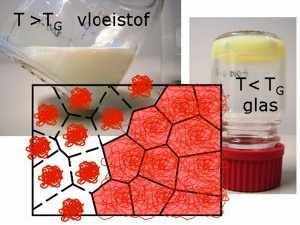Jan 9 2009
Liquid or glass, hard or soft - researchers at the University of Twente are investigating a new 'model material' that can adopt a series of different properties. This is possible because of miniscule balls of knotted polymers which become enlarged as the temperature drops. It has interesting potential for research into the consequences of ageing in the properties of glass, which can serve as a model for the natural process of ageing. Researchers in the Physics of Complex Fluids group have published a paper on the subject in Physical Review Letters.

The size of the polymer balls is on a nano scale - at 40 degrees, their diameter is around 100 nanometres and at 20 degrees they become enlarged to about 200 nanometres and also increase in softness. The transition from liquid to solid (or glass-like) can be controlled in a number of ways, resulting in glass that varies in hardness. Just a few particles that have become significantly enlarged can occupy the same amount of space as many particles that have only enlarged slightly: in both cases the result is a solid material, but the glass in the first instance is softer than in the second.
Ageing
These soft glass-like materials can serve as a model for a range of different natural processes as they are extremely sensitive to external stimuli. Age plays an important role in this. Older glass responds differently from glass that is young. If you press it, it takes longer to regain its original form: the older the glass, the longer it takes to re-establish its internal consistency. This depends on how easily the particles are able to move around each other. Softer particles can move around each other even when in contact, while harder particles block each other, as they are less capable of being compressed together.
As a result, this fascinating material also opens up new insights for biologists, for example, who can use it to learn about the processes at work in living matter.
The research was conducted by Prof. Frieder Mugele’s Physics of Complex Fluids group. The group is part of the University of Twente’s IMPACT and MESA+ research institutes.
The paper ‘Glass transition and aging in dense suspensions of thermosensitive microgel particles’